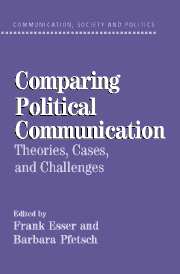Book contents
- Frontmatter
- Contents
- Contributors
- Comparing Political Communication
- INTRODUCTION
- I THEORIES AND METHODS
- 2 Americanization, Globalization, and Secularization: Understanding the Convergence of Media Systems and Political Communication
- 3 Transnational Trends in Political Communication: Conventional Views and New Realities
- 4 Comparing Mass Communication Systems: Media Formats, Media Contents, and Media Processes
- 5 Designs and Methods of Comparative Political Communication Research
- II CASES
- III PERSPECTIVES AND CHALLENGES
- Author Index
- Subject Index
- References
4 - Comparing Mass Communication Systems: Media Formats, Media Contents, and Media Processes
Published online by Cambridge University Press: 24 November 2009
- Frontmatter
- Contents
- Contributors
- Comparing Political Communication
- INTRODUCTION
- I THEORIES AND METHODS
- 2 Americanization, Globalization, and Secularization: Understanding the Convergence of Media Systems and Political Communication
- 3 Transnational Trends in Political Communication: Conventional Views and New Realities
- 4 Comparing Mass Communication Systems: Media Formats, Media Contents, and Media Processes
- 5 Designs and Methods of Comparative Political Communication Research
- II CASES
- III PERSPECTIVES AND CHALLENGES
- Author Index
- Subject Index
- References
Summary
For a long time comparative media research led nothing more than a shadowy existence in international communication. This corresponded to a generally low interest in activities in other parts of the world. If at all, it was above all American developments that were included in the analysis. However, even descriptions of the United States remained rather superficial – this country often served the purpose of being either a dream or a nightmare vision, that is, a projection of one's own thoughts, while at the same time its existing contradictions remained unperceived. In a globalizing world, cross-national developments have more immediate and weighty results at home: Satellites allow an insight into programs from other continents, the Internet provides access to information from every corner of the world. More directly than ever before, we are confronted with other cultures and their media products. The incomprehensible must be understood and translated into the language of our particular experience. Comparative research is deeply involved in trying to gain an understanding of a politically and culturally fragmented world, which, of course, also shares common features. Both the common features and the differences are at the core of every comparative approach.
THE BASICS OF COMPARISON AND THE GENERATION OF COMPARATIVE THEORY
Comparison can be seen as a universal category of human behavior in everyday life (“comparing prices”) just as in the structured, methodological procedures of science (e.g., legal and linguistic comparative studies).
- Type
- Chapter
- Information
- Comparing Political CommunicationTheories, Cases, and Challenges, pp. 64 - 86Publisher: Cambridge University PressPrint publication year: 2004
References
- 10
- Cited by



